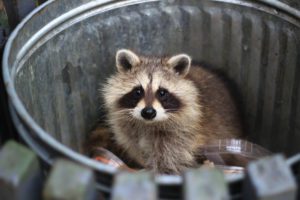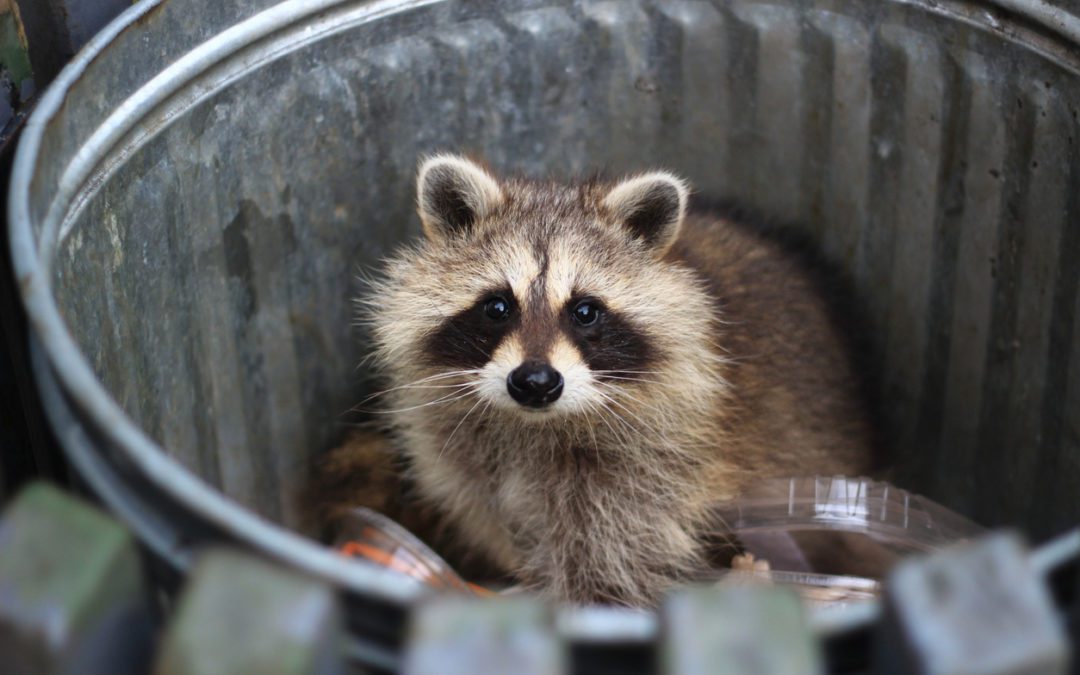Intelligent and opportunistic, raccoons are one of the most common nuisance wildlife species handled by animal control companies. They aid in controlling plant and pest populations, preferring a diet consisting mainly of insects, plant matter, and small vertebrates. But ever-expanding urban and suburban development is leaving fewer and fewer natural raccoon habitats, forcing this species to turn to alternative food and shelter sources for survival.
Raccoons are a perfectly normal part of our environment, and encountering one outside on your property is no cause for panic. But if you experience a continuing problem with trash can raiding or suspect animals may be denning in your home, you’ll probably want to know how to get rid of raccoons.
How to Get Rid of Raccoons
Secure Trash Cans
Raccoons inhabiting areas of dense human population tend to forage in dumpsters and trash cans since garbage is a convenient food source. For
Lawn Maintenance
Raccoons can also ruin lawns, gardens, and flower beds while digging for insects. If you notice that portions of your landscaping have been torn out of the ground, treating the soil for grubs can help prevent a continuing long-term raccoon problem.
Bird Feeders
Because raccoons are excellent climbers, bird feeders are another common source of nourishment. If you’re concerned about how to get rid of raccoons that are accessing your bird feeders, try adding some hot chili powder into the seed mix. Mammals are sensitive to the heat-inducing properties of the capsaicin in the pepper while birds don’t contain the taste receptors necessary to process that sensation. Raccoons and squirrels will be repelled, and birds won’t notice a difference. However, if this problem persists, it may be necessary to relocate or remove the feeders.
Animal Proofing
In the wild, raccoons avoid open, grassy areas preferring a habitat with an abundance of trees. This provides them with a means to climb up and away from danger as well as ample denning locations in hollows and crevices. In urban and suburban settings, these climbing and denning instincts lead raccoons to breech the attics and chimneys of structures in search of a safe living space. They will also nest beneath structures in the abandoned dens of other animals.
To prevent raccoons from entering your home or business, ABC Wildlife inspects the exterior of the building for any holes or crevices through which they may gain access. Raccoons require an opening only as large as their head to breech a structure. We cover chimneys and roof vents with guards that are specially designed to prevent the entry of nuisance animals. ABC Wildlife also replaces damaged shingles where raccoons may be able to tear through the roof.
Raccoons in Your Home
If you detect evidence of raccoon activity in your home, contact the nuisance wildlife specialists at ABC Wildlife immediately. Raccoons carry a variety of health risks including leptospirosis, raccoon roundworm, and rabies and should not cohabitate with humans.
Indicators of raccoon presence in a home include loud scuffling or thumping, shingles torn off the roof, muddy paw prints up the gutter, bent or mangled vent caps, and if there are babies present, chirping or squeaking noises. Our animal control technicians will be able to identify the entry point and work with you to create an effective and efficient plan to remove the raccoons from your home as well as provide you with solutions to reduce the likelihood of future animal breech. We know exactly how to get rid of raccoons, and we’re ready and eager to help you with your problem today. Call (847) 870-7175 to speak with one of our friendly representatives!
Sharing is caring! If you’ve learned something from what you’ve read, please click one of the icons below to share this post on social media.



